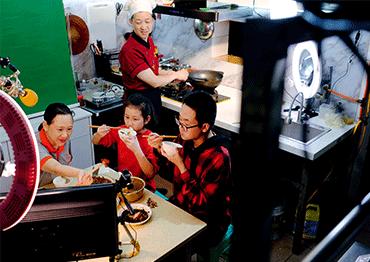Behind mukbang’s popularity is a modern reality: Many people live and eat by themselves.
While researching the mukbang phenomenon, South Korean scholar Hong Seok-kyeong found a direct relationship between the mukbang trend and the number of young single South Koreans who live alone and are reluctant to marry due to an unstable career.
According to South Korea’s 2015 census, there were about 5.2 million single-person households. This accounts for 27 percent of all households and is the first household type to surpass the traditional three- or four-person household.
“This change is important to mukbang. It is not pleasurable for single-person households to prepare food for themselves and eat alone in silence, as this lacks the cozy atmosphere of a family gathering. They face the TV or computer monitor while eating, with mukbang serving as their ‘meal mate’ to soothe their loneliness during mealtime,” Hong wrote in his research essay “Internet Mukbang (Foodcasting) in South Korea.”
It is similar in China. In recent years, in a meaning opposite to that in the West, the term “empty-nest” has come to describe young, singles in their 20s and 30s who work and live alone in cities.
By the end of 2018, there were over 77 million “empty-nest” youth in China, according to statistics from the Ministry of Civil Affairs. They live alone in rented apartments and work in big cities. In a China Youth Daily survey from 2016, more than half cited the lack of emotional connections as the biggest challenge for empty-nesters. To deal with loneliness, empty-nesters either hide in their rooms watching soap operas or seek escape in video games.
In China, mukbang hosts and viewers are mostly young people in major cities. According to statistics from video-sharing platforms Youku and Sohu Video, viewers are concentrated in eastern areas, among which Beijing ranks the first, followed by the Yangtze River Delta and Guangdong Province.
Mukbang host “Virgo Foodie” created separate WeChat groups for mukbang lovers according to region. “The Beijing group is the largest, but groups of some remote provinces like Ningxia almost have no members,” he told NewsChina.
Many dine with mukbang hosts for a sense of companionship and gathering. “Sometimes I feel so lonely when I eat alone. I even feel sad about it. Then I’ll watch a mukbang video. It gives me a little comfort, as if there was a person at the other side of the table eating with me,” Monica said.
“Viewers love to talk with me while I eat. They leave messages like ‘your videos give me a good appetite’ or ‘I always watch your videos while having dinner, as if you were accompanying me,’” Mai Zi, a 22-year-old mukbang host from Beijing, told NewsChina. “Some people would say thoughtful things like ‘The weather is pretty good in Beijing today, but it’s getting cold so keep warm.’”
But not all the messages are heartwarming.
“You’re as fat as a pig. You’ve got three layers of fat on your abdomen. Do you have a spare tire around your belly?” one viewer said during a livestream session.
Mai doesn’t let the abuse and trolling bother her. “Some people watch my videos because they want to find a place to vent their repressed emotions. I can both understand and accept it,” she told NewsChina.
“If hurling abuse on my videos will make yourself feel better, then go ahead, dear. I don’t mind,” she said, responding to the viewer’s insult while livestreaming. “My show is a place that helps people relieve their pressures and feelings however they choose. To some extent, the precise reason for shows like these is to comfort people like you.”

 Old Version
Old Version





